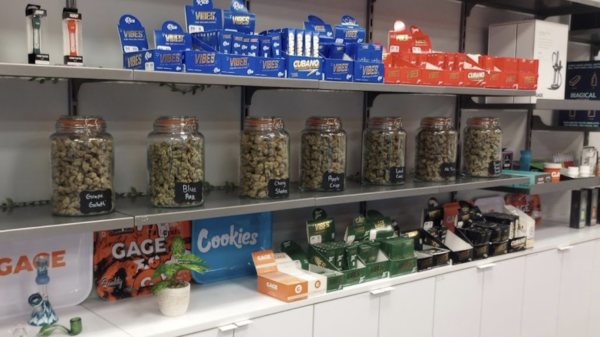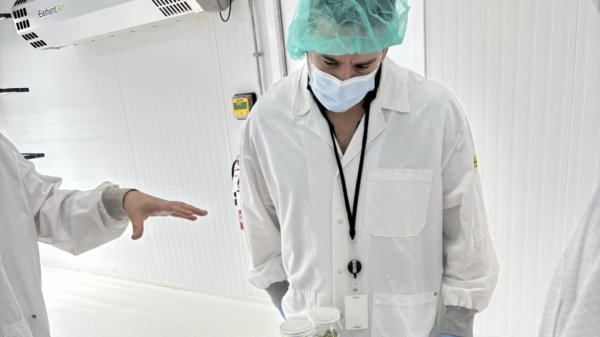Letting people who inject drugs have low-barrier access to cannabis could help their chances of ceasing injections, according to a new study.
Over a 12-year period, the observational study followed three groups of Vancouverites who inject drugs, and found that daily cannabis use was associated with a 26 per cent higher likelihood of stopping injecting opioids, over those who didn’t use cannabis regularly. At-least-daily cannabis users were 16 per cent more likely to stop injecting overall.
This research adds to an emerging body of knowledge that suggests cannabis can be used as a harm reduction tool for vulnerable populations. Legalization originally caused concern because not enough was known about how cannabis policies would impact people who inject drugs during the ongoing overdose crisis, noted the study.
“Substance use disorder, addiction, is a chronic condition that many people have to live with their entire lives. Unfortunately many of those lives are characterized by injection, cessation, relapse and all that sort of stuff,” M-J Milloy said in a phone interview. Milloy is a research scientist at the BC Centre on Substance Use, the Canopy Growth professor of cannabis science at the University of British Columbia and the principle investigator of the study.
And while a lot of people’s goals are to one day not use any drugs, “The reality is that many people will relapse. And there is nothing wrong with that,” Milloy says.
That’s why the study’s preliminary findings are a cause for optimism, he said. If his research team can recreate these findings in a clinical trial then the government would have to step in and ensure equitable access to cannabis for vulnerable populations, like people who use or inject drugs.
Read more: Daily cannabis use could help battle overdose crisis: study
“The overdose crisis remains a public health emergency. We continue to lose unprecedented numbers of our fellow citizens to a completely preventable cause of death. People from the affected community, researchers, clinicians — everyone says we need to put more tools in the hands of people to protect themselves, protect their loved ones and their community members,” Milloy says.
New: At least 175 more people died from highly toxic illicit drugs in B.C. in July. That’s 5.6 people every day this month, 909 so far this year.
June deaths now 177 (with conclusion of more death investigations); May, 174.
5,926 people dead since 2016. pic.twitter.com/qAdce5jbti
— @andreawoo.bsky.social | 鄔瑞楓 (@AndreaWoo) August 25, 2020
“We have preliminary evidence that cannabis might be one of these tools, and we are doing all we can to generate conclusive evidence to demonstrate that. However, in an emergency you don’t wait to issue to life-jackets to make absolutely sure they work. I would hope studies like this provide the evidence that policy makers need to take tentative pilot steps to hopefully save the lives of a lot of people.”
The study was conducted by UBC and the BCCSU, funded by the United States federal government and published in the October 2020 issue of the American Journal of Public Health.
It recruited 2,459 people who inject drugs and were 18 and older, from September 2005 to November 2018. Researchers recruited people from the city’s At-Risk Youth Study (ARYS), AIDS Care Cohort to Evaluate Exposure to Survival Services (ACCESS), and Vancouver Injection Drug Users Study (VIDUS). These three groups really represent the three most important groups at the highest risk of overdose, according to Milloy: street involved youth who maybe have yet to inject drugs, HIV-at risk adults who inject drugs and people who are living with HIV who inject or have injected drugs in the past.
During the 12-year study 55.8 per cent of participants reported injection cessation, defined as going six months without injecting drugs. Of those who reported stopping injecting drugs for at least six months, 54 per cent reported at least one relapse over the 12-year period.
The important thing is that, even though the study doesn’t account for why people stopped injecting drugs, the 666 participants who reported daily cannabis use had a significantly higher chance of stopping injecting opioids in the first place, Milloy explains.
That suggests regular cannabis use can help people stop injecting heroin, fentanyl or prescription opioids. The study did not find that cannabis helped people stop injecting stimulants, including cocaine, crack cocaine, and crystal methamphetamine.
Read more: Cannabis is the overdose prevention tool we don’t use: symposium
The study also didn’t find any connection between regular cannabis use and how long people stopped injecting drugs for, but that could be because the study was limited in length, Milloy said.

“In an emergency you don’t wait to issue to life-jackets to make absolutely sure they work. I would hope studies like this provide the evidence that policy makers need to take tentative pilot steps to hopefully save the lives of a lot of people,” says M-J Milloy, Canopy Growth professor of cannabis science at UBC. Submitted photo
Researchers didn’t ask participants what cannabis they used or what their reasons for using cannabis was. Milloy says they can make a pretty solid guess that, since the study started in 2005, that most of the cannabis was high-THC flower bought from the illicit market.
Previous studies have shown people who use cannabis daily are self-medicating for things like chronic pain, anxiety and depression. People’s intentions for using cannabis, or the type of cannabis they were using, could have something to do with why cannabis helps people stop injecting opioids but not stimulants — ultimately, they don’t know and more research is needed, Milloy says.
Read more: ‘It actually works’: Vancouver study shares stories of youth choosing weed over harder drugs
It’s not just cannabis that can help someone stop injecting drugs. If a person has a stable home, a job, social support, access to health and social services, are younger and HIV-negative, their chances of quitting injection drugs goes up. If someone uses daily, injects a combination of heroin and cocaine, is homeless, survives on an illegal income and has a history of sexual abuse, their odds of quitting injection drugs goes down, according to the study.
Because this is an observational study where marginalized and largely racialized people had to self-report illicit drug use, it’s possible that there’s a margin of error, Milloy said. But because the researchers worked to build trusting, confidential and respectful relationships with the participants, he says it would be insignificant.
Study participants were paid $40 for their time each visit, with over 75 per cent of participants returning every six months to be interviewed, according to Milloy.
Top image via Deposit Photos
michelle@mugglehead.com
@missmishelle














